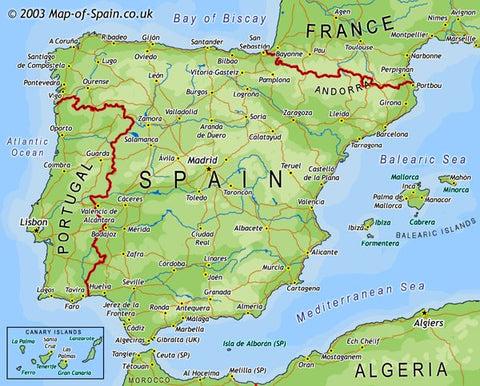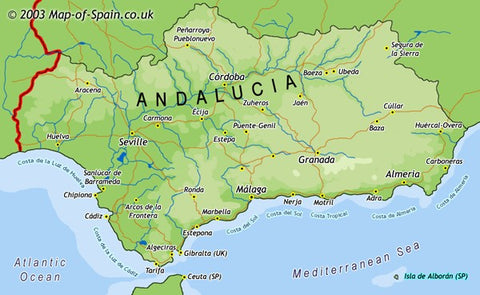About our Olives and Oils
Spain is renowned for producing some of the best olives in the world, both for making olive oil and for eating as delicious table olives. Andalucía contributes 80% of national production and the Andalusian city of Jaén is known as the olive capital of the world, this is where we source our olives and olive oil.

Spain is the world's biggest producer of olive oil; in fact, Andalucía alone produces more than any other country. Indeed, output is increasing due to improvements in quality control and production methods and these improvements, along with improved filtration, have led to greater demand.
Spain is also the world's biggest exporter. This is not obvious if you look at the supermarket shelves here in the UK, where you could assume Italy exported more, but a large percentage of Spanish Extra Virgin olive oil is exported to Italy (and other countries) where they label it and pass it off as their own product. Beware of labels claiming ‘Bottled in Italy': it's probably a blended mixture of Spanish and North African olive oils. Even the most widely-available ‘Italian’ brands are not immune from this trend.
Production in 2003/4 was 1,153,230 tons of which Jaén produced 609,353 tons (Guía Mercacei de los Aceites de Oliva Virgen Extra de España 2nd Edition, 2004. Madrid: Edimarket)
However, it is not only in statistical terms that Spain excels. Its Extra Virgin Olive Oil is of the highest quality: no wonder they export so much.
Other countries are now starting to produce oil in an attempt to compete but they have a long way to go to catch up with the original and the best: Spain.
We source our olives from villages close to the city of Jaén, in the middle of the Andalusian olive oil producing area. Jaén itself lies an hour north of Granada by car or bus (about seven hours by train!). You will not find anyone working there after 1pm during the baking summer months. It is as far removed from slick, superficial, oppressive Wall Street-style practices as it is humanly possible to be. However, that only adds to the region's attractions.
Both Torredelcampo (for olive oil) and Torredonjimeno (olives) are small towns although we would probably call them villages. Soon after midday, the scorching sun and the attraction of the bars, the gazpacho and the prospect of a siesta later have cleared the streets and the shutters are closed on all the houses. There are no tourists here and few foreign businessmen ever visit in person. In winter, the freezing, biting wind and the deep snow contrast with our traditional images of Spain and remind us of the difficult existence people in this area have endured for centuries, and continue to endure, given the severe winters (like 2004/5), droughts which have gone on for 18 months or more and houses built to combat summer temperatures of over 40 degrees rather than snow and winds.
I am the sole UK importer for both our olive and olive oil suppliers; their products are aimed at, and suited to, the Spanish domestic market. Their products are as authentically Spanish as it is possible to get and they sell widely across the whole of Spain. The Olive Store now brings that authentic taste of Spain back home to Britain.
Olive Oil Production
While Spanish Extra Virgin Olive Oil has traditionally been marketed internationally by a few large multinationals from Catalonia and the Basque Country in the north of Spain, far from the main olive growing regions, small producers had neither the financial backing nor the technological know-how to reach out to foreign markets. Oleocampo was established to represent and commercialise the oil from three local cooperatives in Torredelcampo, Andalucía. The beauty of this has been the mix of 100-year-old plantations with some more modern ones and with state-of-the-art production, filtration and quality processes.
The olives are picked and sent as quickly as possible for processing to avoid squashing those at the bottom. They are washed to remove the mud, twigs and leaves. The olives are then pressed and the first juice which comes out is the Extra Virgin Olive Oil. You will often see it referred to as a ‘first cold pressing' as no hot water or chemicals can be used to extract the juice at this stage. The residues at several further stages are then sold off to other companies and used to produce lower grades of Olive Oil and Orujo. You would be staggered if you saw what is used to make these lower grades. Always insist on Extra Virgin Olive Oil.
At Oleocampo, storage is in new stainless steel vats and the bottling is done in-house. The desire to supply only the highest quality has resulted in the company obtaining Product Certification and it has the Environmental Management Certificate ISO 14001. Nowadays, quality is determined and certified by tasting which is carried out by Spain’s top tasters in the on-site tasting suite which resembles the set from the Generation Game television show.
The Picual variety of olive is the most important in Spain with 700,000 hectares dedicated to its growth. It is predominant in the province of Jaén, the largest olive growing area in the world. The Picual grows well in hilly and mountainous areas and can deal well with cold or snowy winters. It is a very juicy variety which has adapted well to modern, mechanised production techniques which have actually improved the texture, purity and taste of olive oil. Its taste diminishes over time and so it is best to consume quickly and not leave it sitting on the kitchen shelf for months. It is high in natural antioxidants and Vitamin E (303 ppm).
